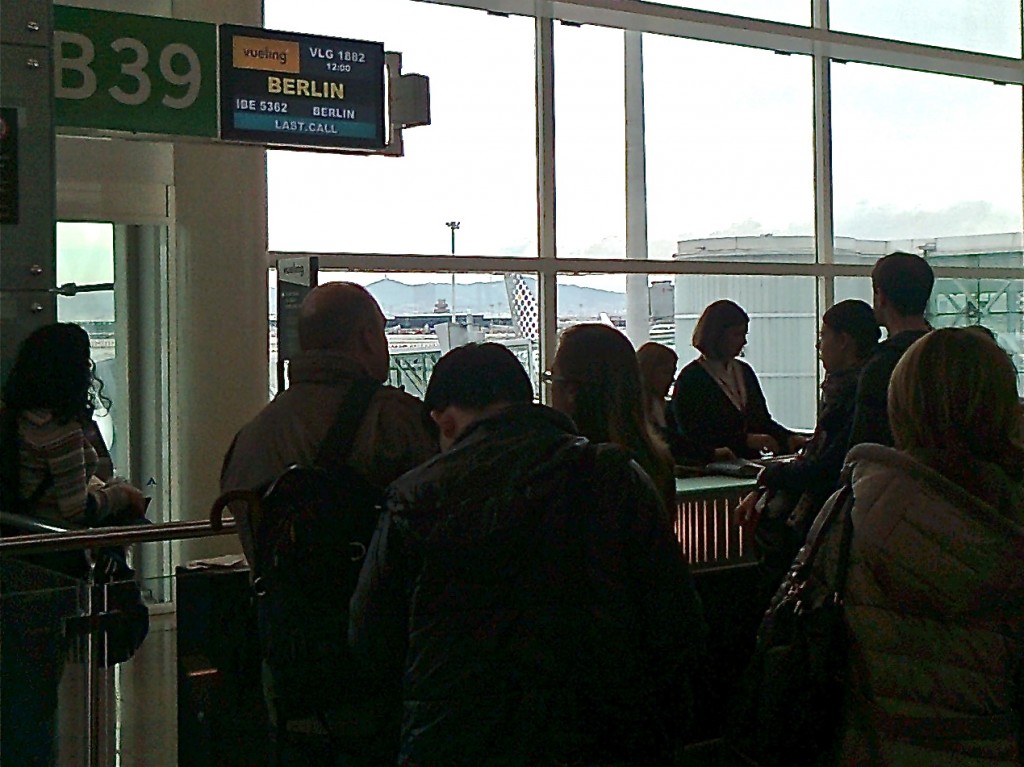The Crisis From Berlin

It’s with relief that I return to Berlin from disheartening trips around Europe, but I also come back angry. The economic crisis in Europe is not visible on the streets here, which means Germans aren’t quick to do enough about it.
In Cádiz, Spain, I meet a young man at a bar in the centre who is clutching a stack of c.v.’s. ‘I carry them everywhere with me’, he says, ‘Just in case I meet someone who has a job for me’.
He tells me that he went to Cologne to look for work, but doesn’t speak German. Language might not be as much of a problem in the Netherlands, where he has a friend who doesn’t speak any Dutch working in a factory. He hopes he can go to Utrecht and get a job too. He shows me his c.v., and I see he has a Masters in Economics. One in four Spaniards is out of work, and more than fifty percent of young people are without jobs. So, canning peas in Holland doesn’t look so bad.

In Seville, in the centre of the erstwhile Andalusian party scene, incredibly, the kings of the late-night, Spaniards!, aren’t going out like before. The streets are deserted by midnight on most weeknights. I thought it was just winter and the rain holding people back. But in the bars, friends guard store-bought beer under tables to fill up surreptitiously their glasses. They complain, ‘It’s cheaper these days to party at home’.
Working in a café on the Alameda, a woman from near Hannover tells me she’s been in Seville ten years and doesn’t want to go back to Germany––‘the cold! and I’m not just talking about the weather!’––but thinks she might have to if the situation continues to deteriorate. ‘The situation is getting rough here. You know, we get huge numbers of c.v.’s a day, and we’re not advertising’.
Things today in Spain remind me of what things were like a couple years ago in Greece. People beginning to feel the pinch of the crisis, but knowing the worst is still to come.

At the European Film Festival in Seville there was a a Greek film (called Boy Eating the Bird’s Food) about a starving young man in Athens who eats animal feed to stay alive (he also eats his own seed, which he explicitly produces in the film in a masturbatory scene). The protagonist is a countertenor and has a beautiful but untrained voice, which he will never have the opportunity to develop it. The director purposefully has the young man singing a text in German: a Bach aria, asking God ‘to have mercy on me’. German is the language of lost opportunity and merciless austerity.
This is an hyper-aestheticised take on the real hardship Greeks are encountering. The reality is of course a heartbreaking breakdown of the safeguards of social democracy. Meanwhile, things are getting worse not just in Greece or Spain, but also in Italy, Portugal, Ireland…
When I return to Germany, which has so far benefited from the Euro crisis, increasing its exports on the back of a weak currency, I feel both relief and anger. There is the sense of artificiality: knowing what is happening elsewhere, but being in the calm eye of the storm. The cafés and bars are full every night of the week, so are the discos. The shops are stocked and not driven out of business. The health care system is functional. There’s immigration not emigration. Europe’s youth is here, on the run, looking for a place to party off their worries and weather the storm. Housing prices are on the rise with the capital flight. Germany is even more sparkly than its usual shiny, clean, organised self.

And I hear Germans saying the following:
‘The Greeks didn’t pay taxes. They lived beyond their means’. ‘The Spaniards borrowed too much money. Look at their housing market’. ‘The Irish had a bubble economy. The Italians hide all their money in their mattresses’. ‘These bailouts are a bottomless pit. It’s not our responsibility’. ‘It’s time they learn to tighten their belts. A little austerity will teach them something’. It’s a mix of lesson-teaching, fiscal responsibility, home-economy ideology, and self-congratulation.
But they are not saying the following enough:
‘The Euro has been good for Germany, but not good for our neighbours which have different economies not based on exports. We have benefitted but they have not’. ‘They borrowed because they could, with the Euro. We have one currency so we have shared responsibilities’. ‘A currency federation over a whole continent can’t work without a central reserve’. ‘Germans are historically afraid of inflation, but it would benefit other countries in Europe right now’. ‘Our policies of austerity are creating suffering and don’t work everywhere’. ‘A lot of Greeks did pay taxes, it’s just that their leaders did not’. ‘Germany has a vested interest in the European project, which has given Europe peace after a half-century of war. We need to act as Europeans in solidarity with one another’. ‘It’s just a matter of time that problems in Europe will finally drag down Germany too. We are focused on short-term growth over long-term stability’.
As George Soros has written, Germany either needs to leave the Euro or lead. The more I travel around European countries affected by the crisis the more I begin to understand that this is not an economic question simply, but also a moral question.
Universal healthcare is suppose to be one of the characteristics of European life, one of the basic rights of a European citizen. In Greece, it no longer exists. The New York Times recently reported on the deteriorating health care crisis in Greece. The unemployed are no longer covered after one year, and cancer patients cannot get essential treatments, and doctors are being presented with symptoms of advanced and untreated chronic illness that they had only seen previously in textbooks. Bribes are now the norm for obtaining treatment in the so-called public system, as they are in other European countries like Hungary and Romania.
The breakdown in health care is paralleled by a breakdown in civil society. The Greek police are collaborating with the rapid rise of racist far-right movements and their brutality. Human Rights Watch has reported on horrific attacks against immigrant communities and sexual minorities. Even tourists in Greece are being brutalised by police, who shake them down for cash.

The welfare state in Europe in the post-war period was created to stave off the rise of the far-right and neutralise the far-left. Europe should remember what happens when people are desperate, hungry and ill. Certainly Germany knows how economic resentments are a driving force for fascism.
On this point, I feel Germany is being bludgeoned with its special responsibility to help the rest of Europe because of its Nazi past, because of what it ‘owes’ everyone else. Meanwhile, German greater involvement in the economics of other countries brings accusations of a second Nazi occupation. This tension exists because few are happy with what Germany is doing to solve the crisis: it’s doing as little as possible.
Germany is deservedly unpopular right now, I have rarely seen a crowd as angry at one person as Greek football fans cursing Angela Merkel appearing on television during last summer’s European championship. People are angry because the cure prescribed is not working, making Southern economies stagnate, tied to a currency that helps Germany and not them. People are angry because if they get seriously ill, they will die.
What is missing then, more than anything else, is solidarity. Where is the notion that there is such a thing as ‘Europeans’ who are responsible for one another? The Nobel Committee’s announcement of the Peace Prize to the European Union, I believe, was a cry for help. Germany has not thought of the crisis in humanitarian terms, but rather in self-interested economic ones. If Germans truly see themselves as Europeans, they have failed in this solidarity. The problem, as we are seeing, is that they don’t.

Guess who works the most hours in europe according to an oecd comparison?
http://www.bbc.co.uk/news/magazine-18144320
the Greeks?
Excellent article, very informative and a considered piece of writing on the European question.
It doesn’t look good for the future of a harmonious Europe.
I am German and very much for solidarity. however, the current form of solidarity does not benefit anyone, but the banks and a small elite, while making all countries compile a huge load of debt which – just look at the UK – will utimately lead to a deconstruction of the welfare state approach across Europe. if there is fiscal support, there needs to be an OPEN DEBATE what for, and it should be provided for specific features of social and economic development that have been outlined by the respective governments after public consultation with their constituencies. simply pitching “rich” Germany against “poor rest” of Europe does not capture anything. Why is it OK if Ireland does not want to raise taxes to average standard but demands money? and, if you look at the history of the EURO (currency), it was the elite of Greece and Italy which were desperate to participate in the monetary union, believing that this would secure their wealth by creating a stable currency.So what I mean to say: Everyone who argues as superficial as does the article above only plays into the hand of the banks, but does in fact not help anyone affected by the Eurozone crisis – including Germans, who have not become wealthy over the last two decades (except for a few) but face precarious working conditions, a dramatic rise in non-living wages, declining money for education, and rising private debt levels to deal with the rising living costs. its not all that simple!
Argo, thank you for your comments. I certainly agree with you that current measures will not help reduce the debt load and that the destruction of the welfare state is the main matter of concern, as I wrote in the article. It is not about pitting Germany against poorer countries, but rather to recognise that Germany is in the best position to provide the economic stimulus that these other countries need. That Germany’s political capital is invested in austerity policies will make Greece’s economy contract and not grow. Contraction with punitive investment rates from creditors is a recipe for increased suffering, as Greece is left without its ability to pay down its debts. I believe the most recent budget will make matters worse for that country. Meanwhile, I don’t believe that the ‘precarious’ situation in Germany can be compared in any way to suffering experienced in Greece at the moment.
Responding to the comment above by Argo, it is true that, by some measures, inequality in Germany is increasing, but to say that Germans “have not become wealthy over the last two decades (except for a few)” is patently wrong (see links below for only a few examples). This combined with the statement that working conditions in Germany are “precarious” makes me wonder if the author of the above comments has traveled much outside of Germany, or is blind to working conditions elsewhere.
Moreover, in what concrete ways is the article above “superficial”? Among many other good points that its author makes, the one about health care in Greece is anything but superficial. It is absolutely unacceptable (and, indeed, a scandal of unbelievable proportions) that some people in the countries struck by this crisis are unable to obtain cancer medication (Greece) or to feed their families properly (Spain). Just imagine what would happen here in Germany if either of these conditions applied! I fail to see how pointing out the dire situation in Greece and Spain, and mentioning how Germany is currently profiting from the crisis, is “play(ing) into the hand of the banks”. Speaking of this, one point the article misses is that Germany is currently able to borrow at rock-bottom interest rates because it is regarded as a safe haven in the crises; in doing so, the German government is able to continue implementing (moderately) Keynesian policies even as it preaches austerity to everyone else.
http://www.oecdbetterlifeindex.org/countries/germany/
http://www.oecd-ilibrary.org/sites/factbook-2010-en/02/02/03/index.html?contentType=&itemId=/content/chapter/factbook-2010-14-en&containerItemId=/content/serial/18147364&accessItemIds=&mimeType=text/html
http://en.wikipedia.org/wiki/List_of_countries_by_distribution_of_wealth